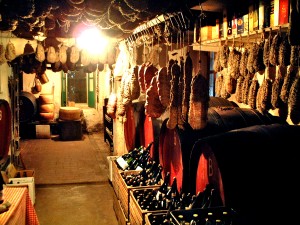Source: Wikipedia
We only offer 100% Italian products, selected, tracks, high quality from these brands:
Three European Union schemes of geographical indications and traditional specialities, known as protected designation of origin (PDO), protected geographical indication (PGI), and traditional specialities guaranteed (TSG), promote and protect names of quality agricultural products and foodstuffs. They are based on the legal framework provided by the EU Regulation No 1151/2012 of the European Parliament and of the Council of 21 November 2012 on quality schemes for agricultural products and foodstuffs. This Regulation (enforced within the EU and being gradually expanded internationally via bilateral agreements between the EU and non-EU countries) ensures that only products genuinely originating in that region are allowed to be identified as such in commerce. The legislation first came into force in 1992. The purpose of the law is to protect the reputation of the regional foods, promote rural and agricultural activity, help producers obtain a premium price for their authentic products, and eliminate the unfair competition and misleading of consumers by non-genuine products, which may be of inferior quality or of different flavour.
These laws protect the names of wines, cheeses, hams, sausages, seafood, olives, olive oils, beers, Balsamic vinegar and even regional breads, fruits, raw meats and vegetables.
Foods such as Gorgonzola, Parmigiano-Reggiano, Melton Mowbray pork pies, Piave cheese, Asiago cheese, Camembert, Somerset Cider, Cognac, Armagnac and Champagne can only be labelled as such if they come from the designated region. To qualify as Roquefort, for example, cheese must be made from milk of a certain breed of sheep, and matured in the natural caves near the town of Roquefort-sur-Soulzon in the Aveyron region of France, where it is colonized by the fungus Penicillium roqueforti that grows in these caves.
This system is similar to appellation systems used throughout the world, such as the appellation d’origine contrôlée (AOC) used in France, the denominazione di origine controllata (DOC) used in Italy, the denominação de origem controlada (DOC) used in Portugal, the denominación de origen (DO) system used in Spain and the Denumire de origine controlată (DOC) system used in Romania. In many cases, the EU PDO/PGI system works parallel with the system used in the specified country, and in some cases is subordinated to the appellation system that was already instituted, particularly with wine, for example, and in France (in particular) with cheese, for example Maroilles (as most others) has both PDO (Appellation d’Origine Protégée (AOP) in French) and AOC classifications, but generally only the AOC classification will be shown.
PROTECTED DESTINATION OF ORIGIN 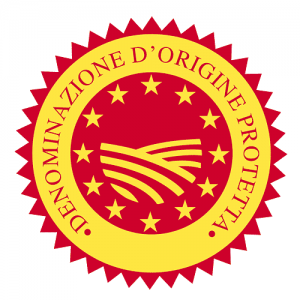
The Protected designation of origin is the name of an area, a specific place or, in exceptional cases, the name of a country, used as a designation for an agricultural product or a foodstuff,
- which comes from such an area, place or country,
- whose quality or properties are significantly or exclusively determined by the geographical environment, including natural and human factors,
- whose production, processing and preparation takes place within the determined geographical area.
In other words, to receive the PDO status, the entire product must be traditionally and entirely manufactured (prepared, processed and produced) within the specific region and thus acquire unique properties.
PROTECTED GEOGRAPHICAL INDICATION
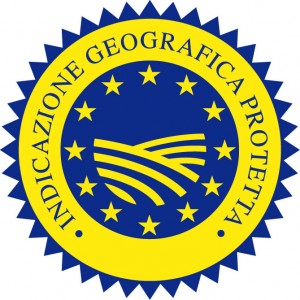 The Protected geographical indication is the name of an area, a specific place or, in exceptional cases, the name of a country, used as a description of an agricultural product or a foodstuff,
The Protected geographical indication is the name of an area, a specific place or, in exceptional cases, the name of a country, used as a description of an agricultural product or a foodstuff,
- which comes from such an area, place or country,
- which has a specific quality, goodwill or other characteristic property, attributable to its geographical origin,
- whose production, processing or preparation takes place within the determined geographical area.
In other words, to receive the PGI status, the entire product must be traditionally and at least partially manufactured (prepared, processed or produced) within the specific region and thus acquire unique properties.
DENOMINAZIONE DI ORIGINE CONTROLLATA E GARANTITA
DOCG is the short version of Denominazione di Origine Controllata e Garantita, a warranty mark used in I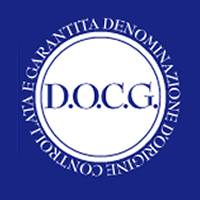 taly, about the wines, for to help who buy wines against fake wines or frauds. This warranty mark show the exact point where the wine was made. A wine before to be able to use the DOCG mark must pass many tests and have some qualities. Often these qualities are for example the little place where we can find the kind of wine, for example just a big hills of just a region in Italy.
taly, about the wines, for to help who buy wines against fake wines or frauds. This warranty mark show the exact point where the wine was made. A wine before to be able to use the DOCG mark must pass many tests and have some qualities. Often these qualities are for example the little place where we can find the kind of wine, for example just a big hills of just a region in Italy.
PRODOTTO AGROALIMENTARE TRADIZIONALE
Prodotto agroalimentare tradizionale, usually abbreviated to PAT, is an official approval for traditional Italian regional food products similar to the Protected Geographical Status of the European Union. A list of approved products is published by the Ministero delle Politiche Agricole Alimentari e Forestali, the Italian ministry of agriculture. It lists only products that do not qualify for pan-European approval, and as such PAT is only applicable within Italy.
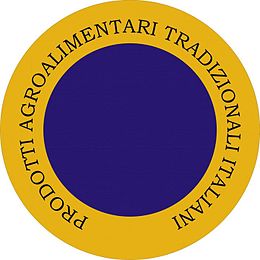 Production is produced by each regional government, in collaboration with the Ministry of Agricultural, Food and Forestry Policies. Tuscany is currently the region with the most PAT products.
Production is produced by each regional government, in collaboration with the Ministry of Agricultural, Food and Forestry Policies. Tuscany is currently the region with the most PAT products.
Visit online store

